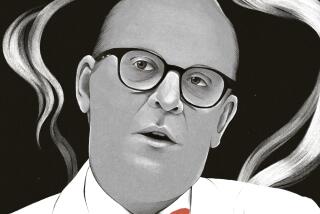Counterpunch: Gore Vidal responds to Charlton Heston
- Share via
On March 17, Sunday Calendar published a letter from Charlton Heston in which he said that Gore Vidal’s account of their involvement in the making of the film “Ben-Hur” “irritates the hell out of me.” Heston was particularly incensed at a statement made by Vidal in the recent documentary film “The Celluloid Closet,” and quoted in Calendar, in which Vidal said that--without Heston’s knowledge--he had written a scene into the film that implied a homosexual relationship between Heston’s character and another. Here is the Heston letter reprinted and Vidal’s response.
*
The deserved success of “The Celluloid Closet” has set all sorts of odd birds atwitter of which easily the oddest is the spokesperson for the National Rifle Assn. and general flak for the National Review, one Charlton “Chuck” Heston. Over the years, I have told the story of how, faced with a hopeless script for “Ben-Hur,” I persuaded the producer, Sam Zimbalist (this was an MGM film and the writer worked not with the director but the producer; later the director, in this case William Wyler, weighed in) that the only way one could justify several hours of hatred between two lads--and all those horses--was to establish, without saying so in words, an affair between them as boys; then, when reunited at picture’s start, the Roman, played by Stephen Boyd, wants to pick up where they left off and the Jew, Heston, spurns him. This is the scene that was shot and this is the scene that viewers of “The Celluloid Closet” watched, with my commentary. Los Angeles Times film critic Kenneth Turan wrote that “seeing an appropriate clip makes a strong case for the truth of Vidal’s assertion that Boyd was in on the scheme while Heston was not.”
Now, Chuck, the hell irritated out of him, as he puts it, has sent what looks like a circular letter to a number of newspapers with his latest version of what went on in Rome that bright spring of 1958. Apparently, as Heston wrote, I “was imported for a trial-run on a script that needed work. Over three days (recorded in my work journal) he produced a scene of several pages which Wyler rejected after a read-through with Steve Boyd and me. Vidal left the next day.” Now one does not expect truth to be exactly a shining Grail (I’m slipping back into Ben-Hurese) for a spokesperson of the National Rifle Assn. and the National Review, but downright lying is not . . . well, wise, Chuck, is it?
In 1978 Heston’s “The Actor’s Life” (he never tells us who the eponymous actor is) was quietly published. Entry for April 23: “. . . I met Willy [Wyler] at the airport, as well as Sam Zimbalist and Gore Vidal, to a great accompanying fanfare of press. . . . “ I was a contract writer at MGM and had written two films (“The Catered Affair” and “I, Accuse”) for Zimbalist. Yet Chuck, in his current letter to the press, says that I am now “determined to pass [my]self off as a screenwriter.” Surely the last thing anyone would want to do, then or now. But I was the screenwriter on the shooting script of “Ben-Hur.” My deal with Sam was that if I did the picture I’d be let out of my contract.
Sam then hired Christopher Fry, who had never done a film, to take over once I had, in my usual swift way, written what proved to be two-thirds of the script.
April 27: Chuck describes a party at Sam’s for “all the brass,” and an edgy conversation with me, published in an earlier version of his diaries, now cut. May 15: three weeks after my arrival (and I was still on the scene), “Today we rehearsed Vidal’s rewrite of this crucial scene with Messala [Boyd]. Indeed the crucial scene of the whole first half of the story. . . . This version is much better than the script scene” (the famous script that we all arrived with was the work, according to Sam, of S.N. Behrmann and Maxwell Anderson), “and Willy brought its virtues out in his usual manner. . . . “ Poor Chuck was spared what Zimbalist and Wyler and I had to say about his astonishing woodenness in a series of readings for us. But then he had been no one’s choice for the film. Newman and Hudson were not available and so Willy brought in Chuck from a western where Chuck had made a convincing villain--guns have always brought roses to his cheeks. It was at about this point that Willy said my thwarted love notion was worth a try, “but don’t tell Chuck because he’ll fall apart.” I was delegated to tell Boyd what the scene’s subtext was; Steve was delighted.
Chuck now adds to his diary entry: “We never shot this scene of Gore’s, or indeed any of the attempts he made on other sequences.” Since Zimbalist was guardian of the pages of the script, no mere actor (or even director) was ever going to know who wrote what. In any case, my “three-day trial run” on the script turns out to have been at least three weeks, according to Chuck’s own journals. By 1995, (“In the Arena”), our memoirist is at it again, rearranging history. In this version, I was “briefly imported for a trial. A tart, embittered man, he seemed an odd choice. . . .” I should note, modestly, that my novel “Julian”--about the 4th century emperor--has been for many years much read in the Modern Library and at the time that I was helping out Sam in Rome I had a hit play (“Visit to a Small Planet”) running on Broadway, an experience Chuck, as actor much less writer, was never to undergo. As I wrote Paul Bowles, “I am doing a fast rewrite of a mammoth epic called ‘Ben-Hur’; I start at the beginning whilst my co-author Christopher Fry, a nice little man who looks rather the way Shakespeare must’ve looked, starts at the end and works towards me. It is predicted that we shall meet during the chariot race, though I rather hope to see him in Pilates’ audience chamber. What fun art is!”
Now let us go backstage and find out what was really going on. Pay attention, Chuck. Just before May 31, as contracted, I departed. Sam gave me the present of a briefcase. On May 31, MGM’s publicity man for the picture, Morgan Hudgens, sent me some pictures of the shooting with the note: “The horses began pounding around The Spina today--quite a sight! The big ‘Cornpone’ . . . “ (Chuck, that’s you, I’m afraid), “really threw himself into your ‘first meeting’ scene yesterday. You should have seen those boys embrace! I’m afraid CH is definitely coming off Secunda in that battle of profiles. We miss you.” I had confided to Morgan my problems with Wyler (“Gore, this is ‘Ben-Hur’ for God’s sake”) and so was pleased that, despite disagreements, he was doing my scene my way.
On 24 July, I got a weary note from Sam. He was pleased with Christopher Fry’s fine-tuning. He offered me a film to write called “Never So Few.” Then, shortly after, I read that he had had a heart attack and died. Wyler’s slowness, MGM’s corporate hysteria (had “Ben-Hur” failed, there would have been no studio--in retrospect, no bad thing)--the whole thing was far too much for easily the nicest person I’ve ever dealt with in the movies. As for the film itself, not one silly frame of it was worth Sam’s life. As for you, Chuck, just remember that wise saying, Oh what a tangled web we weave when first we practice to deceive.
Heston’s Letter
What are we to make of Gore Vidal? He’s earned a respectable reputation as essayist-novelist, but now he’s determined to pass himself off as a screenwriter, particularly of “Ben-Hur.” Your piece on the portrayal of homosexuals in film demonstrates his obsession (“Opening Hollywood’s Closet,” by Eric Gutierrez, March 10).
Vidal, over the years, has made more and more extravagant claims of authorship. He was in fact imported for a trial run on a script that needed work. Over three days (recorded in my work journal), he produced a scene of several pages which Wyler rejected after a read-through with Stephen Boyd and me. Vidal left the next day.
Vidal’s claim that he slipped in a scene implying a homosexual relationship between the two men insults Willy Wyler and, I have to say, irritates the hell out of me.
CHARLTON HESTON
Beverly Hills
More to Read
The biggest entertainment stories
Get our big stories about Hollywood, film, television, music, arts, culture and more right in your inbox as soon as they publish.
You may occasionally receive promotional content from the Los Angeles Times.









